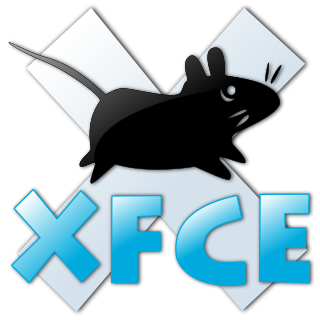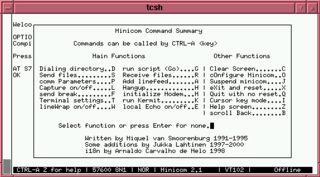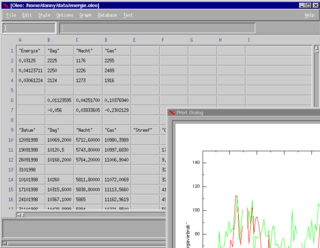
Xfce or XFCE is a free and open-source desktop environment for Linux and other Unix-like operating systems.

A man page is a form of software documentation usually found on a Unix or Unix-like operating system. Topics covered include computer programs, formal standards and conventions, and even abstract concepts. A user may invoke a man page by issuing the man command.

The Oberon System is a modular, single-user, single-process, multitasking operating system written in the programming language Oberon. It was originally developed in the late 1980s at ETH Zurich. The Oberon System has an unconventional visual text user interface (TUI) instead of a conventional command-line interface (CLI) or graphical user interface (GUI). This TUI was very innovative in its time and influenced the design of the Acme text editor for the Plan 9 from Bell Labs operating system.

curses is a terminal control library for Unix-like systems, enabling the construction of text user interface (TUI) applications.
In computer programming, glob patterns specify sets of filenames with wildcard characters. For example, the Unix Bash shell command mv *.txttextfiles/ moves all files with names ending in .txt from the current directory to the directory textfiles. Here, * is a wildcard and *.txt is a glob pattern. The wildcard * stands for "any string of any length including empty, but excluding the path separator characters ".

In computing, text-based user interfaces (TUI), is a retronym describing a type of user interface (UI) common as an early form of human–computer interaction, before the advent of bitmapped displays and modern conventional graphical user interfaces (GUIs). Like modern GUIs, they can use the entire screen area and may accept mouse and other inputs. They may also use color and often structure the display using box-drawing characters such as ┌ and ╣. The modern context of use is usually a terminal emulator.

In some operating systems, including Unix and Linux, a pseudoterminal, pseudotty, or PTY is a pair of pseudo-device endpoints (files) which establish asynchronous, bidirectional communication (IPC) channel between two or more processes. The master provides means by which a terminal emulator process controls the slave. The slave emulates a hardware text terminal device. PTY are similar to bidirectional pipes.

Minicom is a text-based modem control and terminal emulator program for Unix-like operating systems including Cygwin, originally written by Miquel van Smoorenburg, and modeled somewhat after the popular MS-DOS program Telix but is open source. Minicom includes a dialing directory, ANSI and VT100 emulation, an (external) scripting language, and other features. Minicom is a menu-driven communications program. It also has an auto ZMODEM download. It now comes packaged in most major Linux distribution repositories such as Debian, Ubuntu and Arch Linux.

GNOME Terminal is a terminal emulator for the GNOME desktop environment written by Havoc Pennington and others. Terminal emulators allow users to access a UNIX shell while remaining on their graphical desktop.

GNU Oleo is a discontinued lightweight free software spreadsheet originally designed as a text-based spreadsheet using the curses library. The last development version of Oleo, 1.99.16, was released in 2001.

Uzbl is a discontinued free and open-source minimalist web browser designed for simplicity and adherence to the Unix philosophy. Development began in early 2009 and is still considered in alpha software by the developers. The core component of Uzbl is written in C, but other languages are also used, most notably Python. All parts of the Uzbl project are released as free software under GNU GPL-3.0-only.

i3 is a tiling window manager designed for X11, inspired by wmii and written in C. It supports tiling, stacking, and tabbing layouts, which are handled manually. Its configuration is achieved via a plain text file and extending i3 is possible using its Unix domain socket and JSON based IPC interface from many programming languages.

Puddletag is a graphical audio file metadata editor ("tagger") for Unix-like operating systems.

cat is a standard Unix utility that reads files sequentially, writing them to standard output. The name is derived from its function to (con)catenate files . It has been ported to a number of operating systems.

mpv is free and open-source media player software based on MPlayer, mplayer2 and FFmpeg. It runs on several operating systems, including Unix-like operating systems and Microsoft Windows, along with having an Android port called mpv-android. It is cross-platform, running on ARM, PowerPC, x86/IA-32, x86-64, and MIPS architecture.

Snap is a software packaging and deployment system developed by Canonical for operating systems that use the Linux kernel and the systemd init system. The packages, called snaps, and the tool for using them, snapd, work across a range of Linux distributions and allow upstream software developers to distribute their applications directly to users. Snaps are self-contained applications running in a sandbox with mediated access to the host system. Snap was originally released for cloud applications but was later ported to also work for Internet of Things devices and desktop applications.

Redox is a Unix-like microkernel operating system written in the programming language Rust, which has a focus on safety, stability, and performance. Redox aims to be secure, usable, and free. Redox is inspired by prior kernels and operating systems, such as SeL4, MINIX, Plan 9, and BSD. It is free and open-source software distributed under an MIT License.

Windows Subsystem for Linux (WSL) is a feature of Windows that allows developers to run a Linux environment without the need for a separate virtual machine or dual booting. There are two versions of WSL: WSL 1 and WSL 2. WSL 1 was first released on August 2, 2016, and acts as a compatibility layer for running Linux binary executables by implementing Linux system calls on the Windows kernel. It is available on Windows 10, Windows 10 LTSB/LTSC, Windows 11, Windows Server 2016, Windows Server 2019 and Windows Server 2022.

Foliate is a free e-book reading application for desktop Linux systems. The name refers to leaves, meaning "(getting) leafy" or "…-leaved".

Qalculate! is an arbitrary precision cross-platform software calculator. It supports complex mathematical operations and concepts such as derivation, integration, data plotting, and unit conversion. It is a free and open-source software released under GPL v2.

















